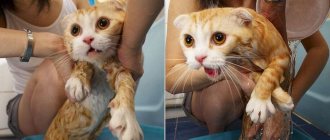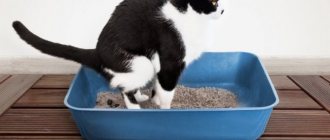Cats are considered one of the most popular pets. According to statistics, there are currently about 600 million domestic cats in the world. And they are all different, because through crossing people managed to create more than 200 breeds. They differ in body size, coat length and many other parameters. But most of them have one thing in common - they don't like swimming in water . When you try to give them a bath, they become very aggressive creatures and begin to scream loudly and scratch violently. Scientists have long known why cats dislike water so much, and there are several reasons for this . They also know breeds that are not at all afraid of water and enjoy swimming in it. So what is the reason for these different preferences?
Cats don't like water and there are several reasons for this.
Violation of thermoregulation
The first reason is the peculiarities of heat exchange of these animals. Between their fur and skin there is an air space that maintains a comfortable body temperature. When wet, this air layer disappears, the animal can freeze or, conversely, overheat.
Dogs, for example, can handle wet hair easily. They vigorously shake drops from their fur. Actively moving, like their wild ancestors during the hunt, dogs dry in motion. In the wild, representatives of the canine family (wolves, for example) lead a social lifestyle, hunt in packs, and can sleep huddled close to each other, keeping warm. Cats are loners, they don’t live in packs, and they don’t like to cuddle with each other.
That is why the animal strives to preserve the thermoregulation mechanism given to it by nature, namely, dry wool.
The cat is swimming
Causes of fear of water in cats
Zoologists have long been trying to consider the question of why cats do not like water. Studies have shown that they are afraid of getting wet rather than coming into direct contact with liquid.
Almost every furry pet has a fear of water.
For your information! Despite their innate instincts, cats are excellent swimmers, and they have developed this skill from the age of one month.
Fear of hypothermia
Fear of freezing is one of the main answers to the question why cats don’t like water so much. Between the fur and skin of pets there is an air cushion that protects from the cold. A stable temperature is maintained due to the body's own heat. Once wet, the fur loses its thermal insulation properties and the cat begins to freeze.
overheat protection
The same air cushion protects the animal from overheating. Direct sunlight does not fall on thin skin, the body does not overheat. Cats cannot provide themselves with cooling; they do not have the ability to get rid of overheating by sticking out their tongues, like dogs.
Viruses in bathing water
A wet surface attracts dirt and dust. The procedure of licking fur leads to the movement of foreign particles directly into the stomach, which can cause poisoning or an infectious disease. The ideal place for active activity of pathogenic microflora (bacteria, viruses, fungi) is a humid environment.
Note! Various harmful microorganisms can accumulate on wet fur, and the instincts inherent in a cat make it afraid of getting sick.
Wet fur interferes with hunting
And others
There are other reasons why cats are so afraid of water.
- Smell. Wet fur smells sharper and sharper, preventing the pet from hunting for small rodents. A cautious mouse will not come out of hiding if there is a clearly visible aroma emanating from the cat’s body. The innate instincts of a hunter actively resist any outside interference that interferes with the extraction of food, even if it is a domestic animal.
- Concerns. Defenselessness against an unknown enemy during water procedures gives rise to cats' aggression towards water. In natural sources they are vulnerable to aquatic predators and large birds, and on land the sense of danger only intensifies, since the persistent smell of wet wool makes the animal visible to larger predators. A secondary problem is the need to lick a wet coat, during which the pet may not hear the potential enemy.
- Danger of deafness. Fluid that penetrates the ear canals leads to inflammatory processes, and in severe cases, to complete hearing loss. Natural instincts remind the cat of a possible problem, and it avoids any contact with a dangerous liquid.
The cat family is naturally clean; they wash themselves several times a day. A domestic cat sincerely does not understand why it needs to be washed not only with water, but also with unknown means. If the procedure is carried out by force, then over time the animal will perceive water and shampoo as personal enemies from which it must quickly run away.
Stressful state
There are many opinions about what cats are afraid of when bathing. There is a simple assumption that the cat is simply experiencing stress. It is not clear to the cat why a person forcibly sits him in a bathtub or basin and starts pouring water on him, causing discomfort.
Wayward, self-sufficient and freedom-loving animals, they have difficulty withstanding this procedure purely psychologically.
Fear of water
Content
1. Reasons why cats don’t like water 2. When to teach a kitten to bathe 3. How to bathe for the first time 4. How to bathe an adult cat 5. How often to bathe
A cat that loves to bathe is perhaps an exception. Most people think so, but only a few know why cats are afraid of water. And bathing a pet for many owners of whiskered furry creatures seems like a painful procedure. Or maybe cats don’t need to be bathed at all, they take such careful care of their coats?
How to train a cat not to be afraid of water
It is necessary to teach from an early age. This should be done in the form of a game, actively using affection and other rewards. The first thing you need to do is show that you shouldn’t be afraid of the bathroom. To do this, you need to place the animal in an empty bathroom, while not forgetting to stroke and speak kind words. The cat must understand that the bath does not contain danger.
Feed in the bathroom with the water on. Small kittens get used to it well after this treatment. After the kitten has gotten used to the noise, you can put a bowl of water in the bathroom so that it wets its paws. To do this, you can throw pieces of foam or other material into the bowl that the cat wants to play with.
After this, you can pour 3-5 cm of water into the bathtub, and then put in a beam or board. Throw play material into the water and let the cat watch the toys from a safe position. Cats are very curious, and soon she will try to get an object out of the water, and maybe even enter the water.
After the cat has become accustomed to the sight and sound of water, you can carefully place it on the bottom of the bathtub and try to wash it. It is better to water it from a separate container; the sound of the shower can scare the animal. It is also better not to use shampoos and other detergents.
When adapting an animal to water procedures, you need to remember simple rules:
- the water should be at a comfortable temperature, 38-40 degrees;
- the animal should always feel the bottom with its paws;
- It is better to lay a towel or other material on the bottom so that the cat does not slide along the bottom of the bathtub.
If your pet strongly resists any attempts to bathe him, leave him alone. From the point of view of expediency, bathing a cat is a completely useless activity.
Swimmer
Are sphinxes wary of water?
How to tell if your cat has a fever
How many years do British cats live?
How to pet a cat correctly
On the contrary, veterinarians advise hairless cats to be bathed regularly. Otherwise they will start to smell unpleasant. Sphinxes perceive bathing adequately - without resistance. But due to the lack of fur, they still freeze.
Among other purebred representatives there are real fans of swimming - the Bengal cat, Rex, Turkish Van, Kurilian bobtail and others. The love of water is more common in pets. They do not fight for survival, but simply enjoy life. Street animals (even those that have a home and owner) behave more carefully. They have a more developed instinct of self-preservation.
What cat breeds love water?
Felines' absolute fear of water has been greatly exaggerated. Cats are excellent swimmers and, if necessary, can move quite quickly in the aquatic environment. Large wild cats such as the jaguar, tiger, serval and speckled cat voluntarily bathe in water bodies without fear of germs, overheating or hypothermia. Among domestic cats there are also many excellent swimmers. Bengal, Siamese, Sphynx, Rex, and Kuril Bobtail cats love to swim.
We hope that now you understand why cats are so afraid of water. Love and understand your pets, and then they will always be healthy!
Mr. Cat Recommends: Legends of Cat Hydrophobia
In fact, cats are not afraid of water at all and even kittens can swim. Most people don’t want it, they don’t like it. And they have reasons for that. Even a couple of legends about Noah's Ark try to explain this fear and hostility.
According to the first version of the story about “every creature in pair,” Noah announced to all the animals gathered on the ark that during the long voyage there should be no quarrels or attacks on each other. But then the Devil himself came into play and, turning into a huge rat, began to gnaw a hole in the hold.
The cat, noticing that the ship was in danger of sinking, caught the rat and strangled it. And the angry Noah ordered to throw the animal into the water as a violator of peaceful neutrality. Later, the savior of mankind was told how the events actually happened and the wet, poor fellow floating behind the ark was returned on board. But all cat descendants have a dislike for water.
According to another legend, there could not have been a cat on Noah’s Ark, since this species had not yet appeared on earth. But the rats began to overcome all the participants in the rescue expedition during the swim. And then Noah ordered Leo to destroy all rodents. The king of beasts did not consider it possible for himself to chase small nimble creatures. He sneezed and created a cat. It was she who destroyed all the pests, but since then she has had a dislike for water and has been wary.
But if you don’t mention myths, cats’ dislike for water is quite explainable at the level of genetic memory. After all, their ancestors appeared in hot, dry steppes and deserts and simply did not know rivers, lakes and seas. Therefore, they have no desire for voluntary swimming. On the contrary, those cat species that historically grew up near water are excellent swimmers and fishermen.
How do cats perceive being washed?
Cosmetics, which are often used during the washing process, greatly irritate the charm of your pet. Copious pouring of water is perceived as a blow, and the sensory system reacts accordingly - you need to escape.
Interesting Facts:
- There are more than 40 breeds of the cat family in the world.
- It is generally accepted that the animal was domesticated by the Egyptians. It's a delusion. The first cats were discovered in Cyprus.
- During the Spanish Inquisition, cats were recognized as servants of the devil, and tens of thousands of pets were destroyed by order of the bishop. This led to the rapid reproduction of rats, and as a result, the spread of plague.
Reasons for bathing a cat
Zoologists say that the animal needs to be washed, but not often. Approximate bathing schedule for furry pets:
- indoor cats that do not go outside - once every 3-4 months;
- animals actively walking in nature - once every 2 months;
- cats without hair - once every 2 months, and in the summer - once a month;
- pets participating in exhibitions - before each performance.
But there are times when a purr needs unplanned water treatments. Reasons for an emergency wash of your mustachioed friend:
- the animal walks independently on the street;
- the cat got dirty in something sticky, sticky or toxic;
- getting rid of tangles;
- assistance in the fight against ectoparasites;
- the cat sheds a lot;
- removal of stuck impurities;
- preparation for exhibitions and competitions.
When it comes to bathing kittens, veterinarians' opinions differ radically. Some believe that a kitten can be bathed for the first time at 1.5–2 months, others say that a pet can take a bath after changing its milk teeth (4 months).
In any case, you should not overuse bathing. It is better to do this for objective reasons.
Cold and hot shower
When you take your pet in your arms, you always feel the warmth emanating from him. This is due to the fact that cats have a higher temperature than ours, and, therefore, the temperature of the water when bathing the animal must be made hotter than we are used to doing for ourselves. For a pet, this means washing in ice water. How many people do you know who will be grateful to you for a forced ice shower and will stand silently, not trying to escape? The skin receptors in a cat, like any other warm-blooded creature, perceive this as violence. And if they beat you, you have to run.
Cats don't really like the smell of perfume, especially if they start rubbing it into their fur. For small predators, such a fragrance is similar to the smell of fertilizers for us. Imagine if you started lathering your lady with something similar. It is unlikely that you would get away with scratches and a dissatisfied look.
Enhancing your own scent
Once the air cushion is destroyed, the animal becomes hypothermic, causing its skin temperature to rise several degrees, resulting in an increase in the cat's natural odor. It would seem, what's wrong with this? However, a cat is a predator that hunts on the sly, and therefore increasing the smell for it is tantamount to failure. Thus, in the cat’s subconscious it is stored that bathing is tantamount to hunger.
As you can see, the complete rejection of swimming is not associated with a feeling of fear of water, but with a banal psychological rejection of the said procedure.
Cats can live a very long time
The cat who lived an unnaturally long time was named Cream Puff: she was born on August 3, 1967 and died on August 6, 2005 - her life span was 38 years and three days. This exceeds the normal life span of a cat by about three times: males live on average 12-14 years, and females - 13-15 years.
The reasons why Perry's cats managed to live so long are not exactly known, but he never fed them with special cat food sold in stores. Most likely, they ate a variety of "natural" foods - bacon, eggs, asparagus and broccoli. In practice, this can be dangerous because cats need certain nutrients that are not always found in human food: for example, cats can go blind if they don't get enough taurine, found in meat, and they also need protein and calcium.
Water is stress
The cat begins to experience stress even before the bathing begins - when it is brought into the bathroom. The animal, with its excellent olfactory abilities, detects the smell of shampoo, with which it has had unpleasant sensations since the last bath; the murmur of water also does not cause delight in the cat - it understands what is about to happen to it and is frightened.
Advice! To at least partially calm the animal, wash it with special shampoos for cats without fragrance.
Owners are not very good at holding their pets under running water for the time necessary for a quality wash - some cats start hysterical even before the bath begins, others hold out for 2-5 minutes, and only a few patiently wait for the end of the unpleasant procedure.
The cat begins to feel stressed even before the bath begins.
But this does not mean that the most seasoned of animals are calm about bathing and water in general. Monitor the condition of your pet during washing: if he is pinched, his heart is pounding, calm the cat down, distract him with his favorite toy or favorite treat, so that the animal develops pleasant associations associated with bathing: after plunging into the water, something will definitely happen something interesting (game), or something tasty (meat).











